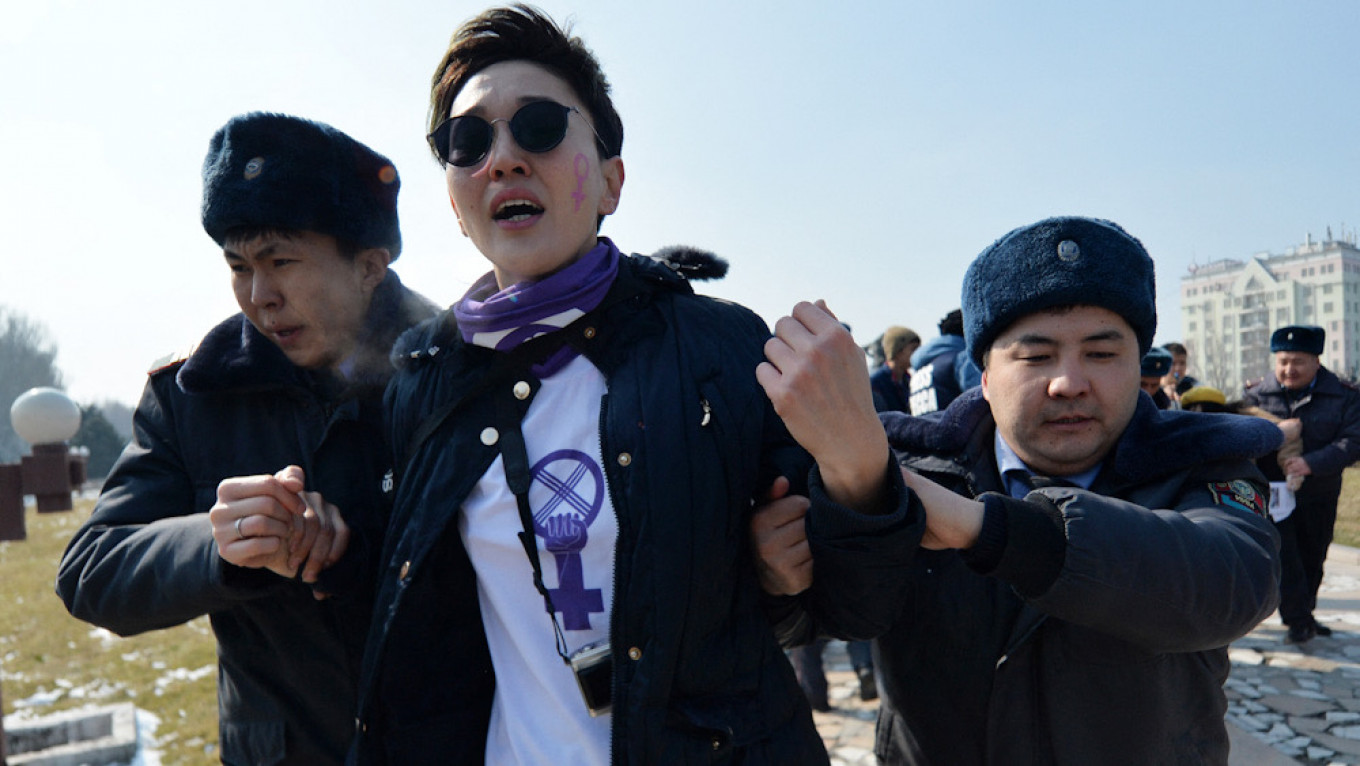
For activists preparing to mark International Women’s Day in Kyrgyzstan, recalling the ambush that broke up last year’s march is still traumatic.
That day, a group of masked men charged the marchers, hitting them with sticks and trampling banners dedicated to equality.
What followed shocked the activists even more.
As the men strolled away, police who had stood by began detaining the victims — a move they later claimed was for the marchers’ own safety.
Gender equality in Central Asia’s most politically turbulent country has taken a back seat to what conservatives call “traditional values.”
Kidnapping for marriage and domestic violence are systemic and mostly go unpunished thanks to indifferent law enforcement and stigma surrounding whistleblowers.
For Nadira Masyumova, one of the rally organisers, the police’s behaviour last year was further proof of state complicity in attacks on activists by self-styled patriot groups.
The 25-year-old noted that the attempt “to frighten activists” was carried out by men sporting Kyrgyzstan’s traditional square white hat.
“Many girls we spoke to are now frightened of the Ak-Kalpak,” Masyumova said, referring to the garment embedded in Kyrgyz culture and whose national day falls on March 5, three days before International Women’s Day.
“Yes it is a symbol of purity and wisdom, but many women now perceive it as a symbol of aggression and terror”.
As they readied to march this year under slogans promoting equal pay, healthcare and education free of sexism, Masyumova said marchers were prepared for any violence.
Values protected, but not women
Successive regimes in Kyrgyzstan have ignored chronic domestic violence and the custom of coerced marriages that survived the Soviet period and forces thousands of women into wedlock every year.
Activists complain authorities are empowering conservative groups that single out feminists, LGBT groups and anti-corruption protesters in smear campaigns.
They are also questioning a clause in a draft constitution — expected to be passed via referendum this year — that could be used to quash dissent.
The article in question allows for restrictions on events “contradicting traditional values” to protect “forthcoming generations.”
One party backing the proposal is the new Nur Party, which has attracted controversy for positioning itself as defending Islamic norms against the secular spirit of the constitution.
The party opposes the Women’s Day march because Kyrgyzstan “is a Muslim country. Our women should live sensibly within the framework of traditional values,” Nur member Ruslan Beknazarov told AFP.
“We gave women a quota in parliament. What other rights do they demand?”
Patriotic groups rose to prominence after a popular uprising in 2010 by tapping into growing religious sentiment and a brand of nationalism celebrating pre-Soviet nomadic culture.
The most notorious is Kyrk Choro (40 Knights) which announced their arrival on the scene with a raid on a karaoke club where they shamed purported sex workers on camera as punishment for fraternizing with Chinese businessmen.
Three leading members of the group refused AFP’s request for interviews.
‘A wave of hate’
Kyrk Choro has not acknowledged any role in last year’s attack on marchers, but the alliance was at the forefront of opposition to an art exhibition against gender violence just months before.
Scheduled to last 17 days in memory of 17 female migrants that died in a print house fire in Russia, the exhibition opened with a nude performance by a female model.
It also included a punch bag in the shape of a female torso and an interactive exhibit that allowed visitors to replicate menial chores performed by women across the country.
But the “Feminnale” was evicted from the museum amid vehement conservative criticism, while the museum’s director resigned under censure from officials and lawmakers.
Altyn Kapalova, a researcher and children’s author who curated the exhibition, emerged as a hate figure.
“People said I should be burned, drowned, made to run around the city naked — a wave of hate,” said Kapalova, who will participate in Monday’s March.
Sometimes she thinks of shelving activism, she said, but channels inspiration “from my audience, from other women.”
“I get distressed. But then something happens to you on the everyday level, something forcing you to defend your rights, your children’s rights,” Kapalova told AFP.